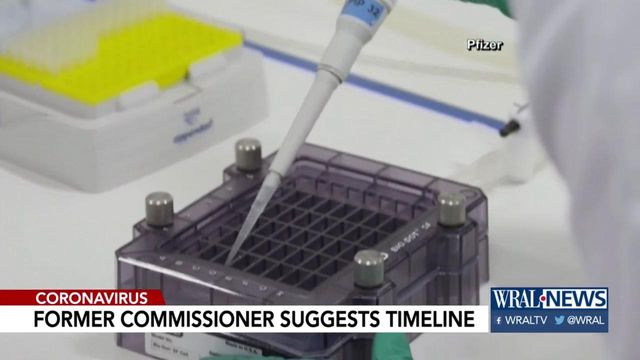Even with FDA OK, new COVID vaccine will take months
Even if the FDA moves quickly to grant an Emergency Use Authorization for Pfizer's new vaccine, Duke experts say you probably won't to be able to get one for months.
Posted — UpdatedTammy Diaz said she would take it now if it were offered to her.
"Unfortunately, we’ve had losses close to us, family-wise," Diaz said. "If it’s something that will help us get the pandemic under control, if it’s safe, let’s do it."
Eric Andresen said he would, too, although, at 21, he says it should go first to the people at higher risk.
"So far, what the doctors have been saying is promising," Andresen said. "I’m not going to argue with them. Either listen to them or listen to people on Facebook, so you’ve got to pick your poison."
Earlier this week, Pfizer announced the vaccine appears to be 95 percent effective. It's one of three candidates showing a lot of promise this week in advanced clinical trials. The other two are made by Moderna and Oxford-AstraZeneca.
Emergency Use Authorization is a limited approval granted by the U.S. Food and Drug Administration only during public health emergencies. It means the FDA believes the drug may be effective.
In the case of the antiviral drug remdesivir earlier this year, the FDA granted an EUA in just a couple of days. But it generally takes a few weeks for regulators to comb through all the data, according to Mark McClellan, a former FDA commissioner who now heads the Margolis Center for Health Policy at Duke University.
"After that, there could be an approval of a vaccine pretty soon. So potentially, vaccines beginning to be available to people in the very highest risk categories in a month or so," McClellan said.
Pfizer says it can be ready to start shipping doses within hours of approval, and can supply 50 million doses by the end of the year. However, the vaccine requires two doses, so that would only treat 25 million people. The U.S. population is 328 million.
"It’s likely going to be a staged process with the first vaccinations going to people who are at highest risk. Health care workers, maybe elderly individuals in nursing homes or other settings that have been really high risk during the course of the COVID-19 pandemic," McClellan explained.
"It’s going to be a while before the general public can get the vaccine," McClellan said. "Then, it’s going to take a number of months after that before we get enough people vaccinated. Enough people have to choose to want to get vaccinated, go through the two shots, so it’s going to be a while before this really starts to affect the risk of COVID spreading in our communities around North Carolina."
Dr. Susanna Naggie, a clinical research expert at Duke University School of Medicine. stressed that FDA regulators are not cutting corners to try to make the vaccine available more quickly. She said she's confident their review will be thorough and complete, and that any vaccine approved through an EUA will be safe.
"I know that the idea of an EUA is something that many people are not used to. We’re not used to this process where things may be approved on a much more rapid timeline," Naggie said. "I think it is absolutely necessary because we do need to get these vaccines out to people as soon as we are confident that we have the appropriate safety."
Related Topics
• Credits
Copyright 2024 by Capitol Broadcasting Company. All rights reserved. This material may not be published, broadcast, rewritten or redistributed.





